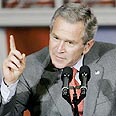
US gains consensus, Iran gains time
Is step taken by Americans Wednesday a tactic move toward forming coalition for attack or strategic change in Washington's policy? Israeli experts on US, Iran offer their interpretation
Prof. Zvi Rafiah, an expert on the US, told Ynet that "this is a dramatic and significant move. The US has thrown down the gauntlet and now it remains to see whether Iran will pick it up."
Dr. Meir Litvak of the Center for Iranian Studies at Tel Aviv university said that the move serves the Iranian interest as "first of all, it postpones the military option, which is a good thing,second – it postpones military sanctions, and third – they gain more time and move forward towards having a bomb."
Zvi Rafiah ruled out the assumption that it was merely a tactical move.
"The move seems like a tactical move, but it can turn into a strategic move if Iran accepts it. The talks can begin with the nuclear issue and continue on to what is happening in Iraq, which the Americans are annoyed with, the issue of terror, etc.," he said.
"This is quite a sophisticated move in which the Americans declare for the first time since the Iranian revolution: 'We are ready to talk to you, show us that you are serious.' Despite all that, one must not conclude that the US has given up on the military option, on the contrary. This option is firm and valid," he adds.
Then maybe it all stems from Bush's grim situation in the polls, which is what is preventing him from embarking on this war?
"First of all, I do not accept the claim that the president rules out a military operation because he is in the worst situation in the polls. We are talking about a firm president who believes in his way. Despite this fact, there is a recognition here that the US cannot embark on a military option without utilizing all possibilities to the fullest and trying to form the broadest coalition possible."
And why did the US choose such a significant move?
"First of all, it wants to try and enlist the support of Russia and maybe even China for sanction in the Security Council and determine the policy that the US would want toward Iran. Secondly, Washington has learned its lesson in Iraq and it wants to prove to everyone – including its own citizens – that it has done everything possible in order to avoid an attack. There is a fundamental change here in the American attitude toward Iran. However, the US has set very clear conditions and it is not at all certain Iran will accept them."
And what about Iran in this equation? Dr. Meir Litvak, an expert on the Islamic Republic, says that "the Iranians are experts in negotiations and can make them last a long time. After all, this is a country which exists for 500 year with a long diplomatic tradition and a 150-year experience of walking on thin ice between superpowers."
"It has a rich culture of foreign policy and I would suggest we do not underestimate that. We are talking about a highly significant capability," he adds.
Do the Iranians view this as an American trick ahead of an attack?
"The Iranians don’t see it as an American plot. They may definitely be trying to neutralize the expected economic sanctions because they are worried about becoming a leprous country."
Will Iran become more moderate following the talks?
"I find it hard to believe that it will become fundamentally more moderate, but there is a chance that the talks will slow the process, and that would be good for everyone. Assuming that the process cannot be stopped and that a military option is difficult to implement, a deceleration will be good both for the Americans and for Israel. Who knows what can happen during a deceleration? Maybe the Iranian regime will change."
"Why, even in 1985, when Gorbachev rose to power in the Soviet Union, no one believed it was close to an end. I'm not saying this could happen tomorrow morning, but at the same time there is another battle – there are historical moves against the regime in the face of its high survival ability. It may definitely become less threatening in a number of years. In any event, it is definitely possible that the Iranians would agree to slow down on their nuclear program until the next window of opportunity."
What is more important for Iran? A bomb or an excellent deal with the US?
"At the end of the day, even if they receive guarantees from the Americans, the Iranians want a nuclear weapon, which will provide them with the status of a regional superpower. As far as they are concerned, it is unthinkable that India, Pakistan and Israel will have such weapons and they won't."
It is important to note that not only Israel and the US are concerned over Iran's nuclear project. So are the Arab countries, particularly the Gulf States, and the issue was raised in talks between Egyptian President Hosni Mubarak and Saudi Arabia's King Abdullah.
"The Gulf States are very worried about the Iranian bomb, but Egypt is more concerned about Israel's nuclear ability. Although the Arab states do not see eye to eye on the issue, the Arab interest is that Iran won't possess a nuclear bomb," Dr. Litvak concludes.










